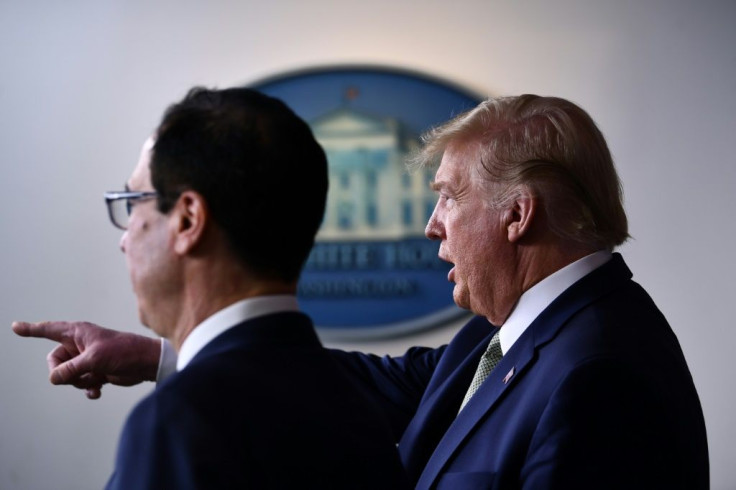Fears Of US Unemployment Spike As Government Prepares Rescue

With the global economy coming to a full stop, the US government wants to send $1,000 checks to all Americans as part of a massive rescue plan, but that may not stop unemployment from skyrocketing.
Treasury Secretary Steven Mnuchin reportedly warned Congress the jobless rate could soar as high as 20 percent from its current 50-year low of 3.5 percent. President Donald Trump has disputed that estimate, saying it represents a worst-case scenario and the country is "nowhere near it."
But economists warn unemployment could indeed reach that level without huge government spending, and it would not even have to go that high to cause Americans massive pain.
The Republican-controlled Senate on Wednesday finally approved a $100-billion package, which the House passed overnight Friday, that provides free coronavirus testing, paid sick leave and expanded unemployment benefits. The bill now goes to Trump for his signature.
But it remains unclear how soon Mnuchin and the Trump administration can finalize a $1.3 trillion emergency spending plan for Congress to approve that would deploy cash payments to Americans immediately.
With uncertainty over when that help will arrive, companies from coffee shops to lunch chains, airlines and the world's largest hotel chain, Marriott, are being forced to shut down and lay off workers.
Gregory Daco, chief economist at Oxford Economics, told AFP the US economy has come to a "sudden stop" making this "potentially the worst contraction in economic activity of all time."
A jobless rate of just five percent would imply a loss of five million jobs, he said.
By comparison, about eight million jobs were lost in the Great Recession following the 2008 global financial crisis, when unemployment peaked at 10 percent in October 2009.
Economists have been repeatedly revising down their economic forecasts and are now calling for a stunning 12 percent contraction in the April-June quarter. Or possible even more.
Their models are struggling to contend with the unprecedented circumstances. Unlike in the 2008 recession, when China and other emerging market economies were growing at a rapid pace, the pandemic is halting activity worldwide.
Without rapid fiscal stimulus "a 20 percent unemployment rate is not unreasonable," said Adam Posen, a former member of the Bank of England's policy board.

Posen, now head of the Peterson Institute for International Economics, told AFP that Mnuchin was right to hammer home the dire warning. It was "being legitimately scary -- not scare tactics -- to say absent fiscal program passage, we are talking a 10-15 percent spike in unemployment."
Asked about the reported 20 percent figure, Treasury said Mnuchin had offered "mathematical examples" to illustrate the potential risk.
The rescue package includes an estimated $300 billion pushed into the economy by allowing businesses and individuals to delay paying up to $1 million of their tax bill, already approved by Treasury.
The remaining $1 trillion must win congressional support and is expected to offer two payments in April and May of up to $1,000 to individuals -- with amounts varying depending on income level and family size -- costing a total of $500 billion, according to a Treasury document obtained by The Washington Post.
In addition, the plan would provide $300 billion in loans to small businesses that could be used to guarantee their entire payrolls for six weeks, the document shows.
It remains unclear when Congress will consider this package.
Senate Minority Leader Chuck Schumer urged rapid action as the economy comes to a standstill.
"I have never sensed a greater sense of uncertainty, a greater fear of the future, of the unknown," the Democrat told the Senate.
Diane Swonk of Grant Thornton agreed, warning, "Nothing can stop the economy from tanking."
She told AFP her initial estimate was of unemployment jumping to 6.4 percent, with a loss of five million jobs. But she warned it "could be much larger."
In another move to soften the blow to American households, Trump ordered the Department of Housing and Urban Development to suspend all new evictions and mortgage foreclosures for 60 days on all government-guaranteed home loans.
The move will allow families "to meet the challenges of COVID-19 without fear of losing their homes, and help steady market concerns," HUD Secretary Ben Carson said in a statement.
The Federal Housing Finance Agency followed suit with a similar suspension for home loans guaranteed by any of the government-sponsored lenders. The agency earlier this month authorized the lenders to grant 12 months' suspended payments to borrowers affected by the coronavirus.
That would cover about two-thirds of the more than $11 trillion in outstanding home mortgages, according to data from Inside Mortgage Finance, an industry publication.
© Copyright AFP 2024. All rights reserved.





















